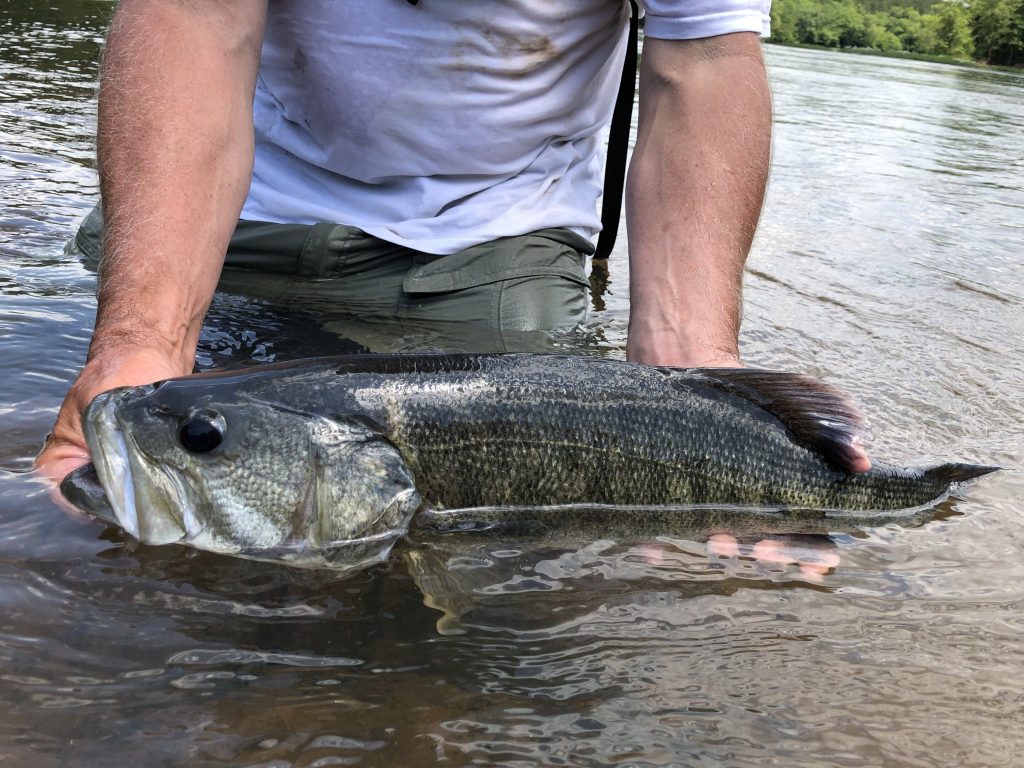Anglers and paddlers closely watch bill intended to make some streambeds off limits in Georgia

A bill’s sponsor says that standing on a streambed would be trespassing under his proposal if the landowner has a land grant predating 1863. Photo contributed by Flint Riverkeeper
Conservationists and environmental groups are sounding the alarm over a measure that they say will unravel the protections for fishing and hunting in Georgia that were fast-tracked last session.
The bill, sponsored by Waycross Republican Rep. James Burchett, has been presented as a follow-up fix after the agriculture industry and private property owners objected to changes made in the final hours of last year’s legislative session.
The Senate’s gatekeeping Rules Committee ushered the measure forward Monday for a potential vote this week as the legislative session winds down. Thursday is the final day of the 2024 session.
Opponents of the proposal are urging lawmakers to reject the bill after Burchett told a Senate panel last week that standing on a streambed would be trespassing under his proposal if the landowner has a land grant dating back to before 1863. Many anglers wade into the water when fishing and boaters use anchors to stay put while casting a line.
A similar proposal, sponsored by Moultrie Republican Sen. Sam Watson, unanimously passed out of the Senate last month but has stalled in the House. That bill, which is supported by advocates for river access, says that a member of the public can access these streambeds “only when incidental to passage and when actively hunting and fishing.”
“The concern I have is ‘takings,’” Burchett told the group of senators last week. “And if we are giving an explicit right to walk on somebody’s streambed that they own with a valid grant pre-1863, I think that’s the first time in statute we would put a statutory right to trespass on somebody’s property.”
A message seeking additional comment sent to Burchett Monday afternoon was not immediately returned. He has pitched his bill as a better balance between private property rights and the right to recreate on Georgia’s rivers. Lobbyists for the agriculture industry have told lawmakers they are concerned last year’s law made them vulnerable to potential lawsuits.

Rep. James Burchett. Ross Williams/Georgia Recorder (file photo)
But Burchett’s comments about standing on a streambed amounting to trespassing have alarmed the same groups that cheered on the surprise passage of last year’s measure.
Gordon Rogers, executive director of Flint Riverkeeper, argued this interpretation could apply to anglers who anchor along rivers, like many people do when fishing for catfish on Georgia’s river bottoms or when trolling for redbreast sunfish and bream.
And Rogers and others worry more private property owners can and will follow suit and close off more public access to the state’s rivers.
“It wouldn’t be a train wreck on day one, most likely, but as the dawn breaks and everybody starts realizing, ‘Oh, my goodness, I’ve got this great fishing ground out in front of my house here. I think I’m just gonna keep people from anchoring here. Sorry, keep moving.’ That’s what we’re looking at,” Rogers said Monday.
Mike Worley, president and CEO of the Georgia Wildlife Federation, said the proposal is a “big step” toward privatizing the wild places that people have paddled and fished for centuries.
“More and more of the streams that have always been available to us, as Georgians, will be off limits to do a lot of the things that we’re accustomed to doing. That’s a troubling precedent,” Worley said.
“We may get to the point where all we can do is go to places where there’s a state park bordering a stream or public land bordering a stream, or have to get permission from private landowners to go on to their stream, and we might even see people charging for it, which is what we saw on the Yellow Jacket Shoals,” he said, referring to the Flint River case that spurred last year’s bill.
Critics of the proposal are pushing lawmakers to cut bait on Burchett’s bill and let the courts finish weighing in on last year’s law. April Lipscomb, a senior attorney with the Southern Environmental Law Center, told senators last week that the new state law is the direct subject of a pending lawsuit.
“Let’s let the courts decide what (last year’s bill) means and then we can figure out if there are changes that need to be made later, let’s make them later. There’s nothing on fire here,” Lipscomb said.
That 2023 law was hurriedly passed after a landowner along a popular fishing spot for shoal bass on the Flint River successfully argued in court that he has control over who can drop a line in the passing waters.
The change spelled out in law that while a private party may own a streambed, the public rights to the flowing water remain.
Burchett, who is the House majority whip, has said he is trying to clarify when property owners along navigable waterways can restrict public access in hopes of heading off more of the violent encounters that have sprung up over misunderstandings on the river.
Paddling groups had already raised concerns that the bill would cut off their access to smaller streams.
Burchett had also attempted to push a separate measure that identified which waterways are navigable – and therefore open to the public – and which ones are non-navigable and require permission from property owners. That bill stalled.
“That was a lot like water over the dam. It was too hard to track it, too hard to keep up with it. It was moving too fast. So that got delayed,” said Rep. Lynn Smith, a Newnan Republican who chairs the House Natural Resources and Environment Committee.
Instead, Smith has introduced a late proposal calling for another study committee that would this time take a closer look at which streams are navigable.
SUPPORT NEWS YOU TRUST.
The post Anglers and paddlers closely watch bill intended to make some streambeds off limits in Georgia appeared first on Georgia Recorder.




